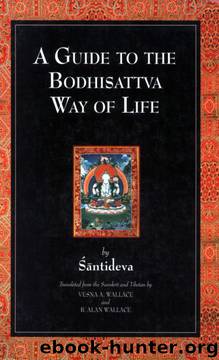A Guide to the Bodhisattva Way of Life by Santideva

Author:Santideva
Language: eng
Format: azw3
Published: 2009-02-03T15:51:00+00:00
Chapter VIII
The Perfection of Meditation
1. Upon developing zeal in that way, one should stabilize the mind in meditative concentration, since a person whose mind is distracted lives between the fangs of mental afflictions.
2. With bodily and mental seclusion, distraction does not arise. Therefore, upon renouncing the world, one should renounce discursive thoughts.
3. On account of attachment and craving for gain and the like, one does not renounce the world. Thus, upon forsaking them, the wise should contemplate in this way.
4. Realizing that one who is well endowed with insight through quiescence226 eradicates mental afflictions, one should first seek quiescence. Quiescence is due to detachment toward the world and due to joy.227
5. For what impermanent person, who will not see his loved ones again in thousands of births, is it appropriate to be attached to impermanent beings?228
6. Failing to see them, one does not find joy nor does one abide in meditative concentration. Even upon seeing them, one does not become satisfied but is tormented by strong desire, just as before.u9
7. One does not perceive reality and loses disillusionment with the cycle of existence. One is consumed by that grief-desire for the company of the beloved.230
8. Because of thinking of that person, life ever so swiftly passes in vain. Due to a transient entity, the eternal Dharma is lost.23'
9. One who acts in the same manner as foolish people definitely goes to a miserable state of existence. They do not like someone who is different. What is gained from association with fools?232
10. One moment they are friends, and the next moment they are enemies. On an occasion for being pleased, they become angry. Ordinary people233 are difficult to gratify.
11. When given good advice, they become angry; and they turn me away from good advice. If they are not listened to, they become angry and go to a miserable state of existence.
12. They feel envy toward a superior, competitiveness with a peer, arrogance toward one who is inferior, conceit due to praise, and anger due to reproach. When could there be any benefit from a fool? 234
13. Between one fool and another, something non-virtuous is inevitable, such as glorification of one's own self, speaking ill of others, and conversation about the pleasures of the cycle of existence."
14. Thus, on account of one's association with someone else, one encounters adversity. I shall happily live alone with a nonafflicted mind .211
15. One should flee far from a fool. One should gratify the encountered person with pleasantries, not with the intention of intimacy, but in the manner of a kind and impartial person .117
16. Taking only what benefits Dharma, like a bee taking nectar from a flower, I shall live everywhere without acquaintance, as if I had not existed before.
17. A mortal who thinks, "I am rich and respected, and many like me," experiences fear of approaching death .211
18. Wherever the tnind, infatuated by pleasures, finds enjoyment, there a thousandfold suffering arises and falls to one's share.234
19. Hence, the wise should not desire it. Fear arises from desire, yet it passes away by itself.
Download
This site does not store any files on its server. We only index and link to content provided by other sites. Please contact the content providers to delete copyright contents if any and email us, we'll remove relevant links or contents immediately.
| Ancient, Classical & Medieval | Anthologies |
| British & Irish | Japanese & Haiku |
| Love Poems | Regional & Cultural |
| Themes & Styles | United States |
| Women Authors |
The Universe of Us by Lang Leav(14381)
The Sun and Her Flowers by Rupi Kaur(13725)
Adultolescence by Gabbie Hanna(8154)
Whiskey Words & a Shovel II by r.h. Sin(7484)
Love Her Wild by Atticus(7238)
Smoke & Mirrors by Michael Faudet(5520)
Wiseguy by Nicholas Pileggi(4601)
The Princess Saves Herself in This One by Amanda Lovelace(4514)
Love & Misadventure by Lang Leav(4362)
Milk and Honey by Rupi Kaur(4233)
Memories by Lang Leav(4177)
Good morning to Goodnight by Eleni Kaur(3808)
Bluets by Maggie Nelson(3722)
Too Much and Not the Mood by Durga Chew-Bose(3701)
Algedonic by r.h. Sin(3508)
Pillow Thoughts by Courtney Peppernell(3414)
The Poetry of Pablo Neruda by Pablo Neruda(3371)
HER II by Pierre Alex Jeanty(3176)
Stuff I've Been Feeling Lately by Alicia Cook(3057)
